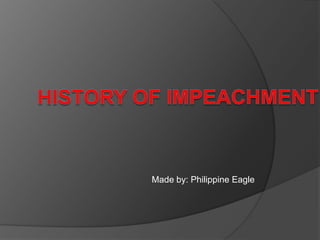
History of impeachment by malik domato
- 1. Made by: Philippine Eagle
- 2. Impeachment in the Philippines Impeachment in the Philippines is an expressed power of the Congress of the Philippines to formally charge a serving government official with an impeachable offense. After being impeached by the House of Representatives, the official is then tried in the Senate. If convicted, the official is either removed from office or censured. Impeachment followed by conviction is often the only way to forcibly remove a sitting official. While "impeachment" is often used to refer to the entire process of removing an official from office, it only formally refers to the indictment stage in the House of Representatives, not the trial stage in the Senate. Under the current Constitution, an official can be impeached if one third of the Sources: House of Representatives votes in favor. Since en.wikipedia.org, it takes only a simple majority to set the agenda images.google.com or to adjourn the House, it can be difficult for a minority of one third to bring a vote and impeach an official.
- 3. Third republic President Elpidio Quirino was accused in 1949 of using government funds to renovate Malacanang Palace in Manila, using government funds to purchase furniture for the Presidential Palace, and linking him to alleged diamond smuggling. A Congressional committee rejected this complaint for lack of factual and legal basis. In 1964, President Diosdado Macapagal was accused of illegally importing rice to build public support in an election, illegally dismissing officials, using the military to intimidate the political opposition, and ordering the deportation of an American businessman who was in the custody of Congress in violation of the separation of governmental powers. A Congressional committee dismissed all the charges. Sources: en.wikipedia.org, images.google.com
- 4. Fourth and fifth republic President-dictator Ferdinand Marcos was accused by 56 lawmakers on 1985 of graft, economic plunder, unexplained wealth, granting monopolies to cronies, and other crimes. the following day the National Assembly committee dismissed the complaints after roughly five hour of discussions for continuing unsupported conclusions. President Corazon Aquino was accused by lawmakers in 1988 of graft and violating the Constitution. The charges were rejected the following month due to lack of evidence. President Joseph Estrada was accused of bribery, graft and corruption, betrayal of public trust, and culpable violation of the Constitution during the impeachment of 2000. Sources: en.wikipedia.org, images.google.com
- 5. Impeachment offenses The Constitution limits the offenses to the following: culpable violation of the Constitution, treason, bribery, graft and corruption, other high crimes, or betrayal of public trust. In the 1935 and 1975 constitution, betrayal of public trust was not an impeachable offense. Sources: en.wikipedia.org, images.google.com
- 6. Culpable violation of the constitution For purposes of impeachment, "culpable violation of the Constitution" is defined as "the deliberate and wrongful breach of the Constitution." Further, "Violation of the Constitution made unintentionally, in good faith, and mere mistakes in the proper construction of the Constitution, do not constitute an impeachable offense." Source: en.wikipedia.org
- 7. Treason According to the Revised Penal Code, treason is defined as "Any Filipino citizen who levies war against the Philippines or adheres to her enemies, giving them aid or comfort within the Philippines or elsewhere." Sources: en.wikipedia.org, images.google.com
- 8. bribery Sources: en.wikipedia.org, images.google.com The Revised Penal Code defines bribery in two forms: Direct bribery is "committed by any public officer who shall agree to perform an act constituting a crime, in connection with the performance of this official duties, in consideration of any offer, promise, gift or present received by such officer, personally or through the mediation of another." Indirect bribery is "committed by a public officer when he accept gifts offered to him by reason of his office."
- 9. Other high crimes or betrayal of public trust In Francisco Jr. vs. Nagmamalasakit na mga Manananggol ng mga Manggagawang Pilipino, Inc., the Supreme Court purposely refused to define the meaning of "other high crimes or betrayal of public trust," saying that it is "a non-justiciable political question which is beyond the scope of its judicial power." However, the Court refuses to name which agency can define it; the Court impliedly gives the power to the House of Representatives, which initiates all cases of impeachment. Source: en.wikipedia.org
- 10. Impeaching officials Any citizen with an endorsement of a member of the House of Representative may file charges. The House Committee on Justice will decide by majority vote if the complaint has substance. The House Committee on Justice will decide by majority vote if the complaint is sufficient in form. The House Committee on Justice will decide by majority vote if the complaint is sufficient in grounds. The House Committee on Justice will decide by majority vote if there is probable cause in the complaint. The House of Representatives will vote to impeach the official. A one-third vote is needed. If the vote passes, the complaint will become the "Articles of Impeachment" and the House will appoint prosecutors who may or may not be members of the House. If the vote fails in any part of the procedure, the official accused can't be filed for impeachment for one calendar year. The Senate will then try the impeached official. Conviction requires a two-thirds vote. If convicted, there are two punishments the Senate can mete out: Censure or a reprimand, or Removal from office and prohibition to hold any governmental office In the 1935 constitution, a two-thirds vote was needed to impeach an official by the House of Representatives, while a three-fourths vote in the Senate was required to convict. Source: en.wikipedia.org